
| Home
| Newbies Guide | Technical Resources
| Lada Niva Clubs | Niva
Lift Kits | Gallery | Links
|

Tyre size.
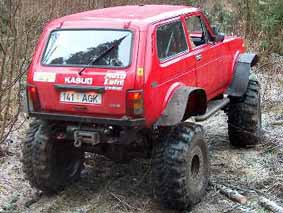
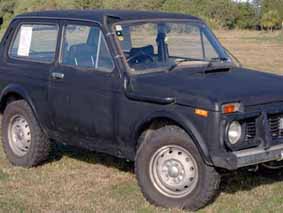
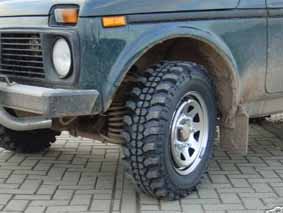
Standard tyres are 175/80R-16 on 5J-16 rims. Taller tyres (ie bigger diameter) are often fitted to gain greater ground clearance. Wider tyres are fitted for their greater width of contact patch with the ground (ie better traction).
The biggest tyres
you can fit on a standard Niva are 195/80R (6.00x16*) on the 16 inch rims, and
205/80R on the 15 inch rims (ie about a 28.3" height maximum).
*Note: Imperial sized tyres are usually 100% aspect ratio
so a 6 inch wide tyre (ie a 6.00) will also be 6 inches tall, however they are
not all 100% aspect ratio so height will be different if not 100%.
You may be able to
fit wider tyres if you can get a lower profile, such as 65R or 75R (eg 205/65R-16
or 215/75R-15). But make sure the overall diameter is not bigger than a
195/80R-16. A good tyre size calculator that includes diameter is here
![]() , or one here
, or one here
![]() that also has Imperial
sizes and rim widths.
that also has Imperial
sizes and rim widths.
The tallest diameter tyres you can fit are around 28.3 inches, or the front tyres will catch on either the rear or front lip of the wheel arch on cornering, and the rear tyres will catch on the rear of the wheel arch lip on articulation. The arches can be easily beaten back at these points to avoid this. Alternately a 2 inch lift and/or arch trimming will allow bigger diameter tyres to be fitted.
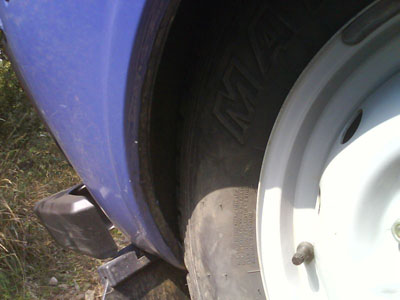
205/80 16s on and un-lifted
and un-arched Niva - clearly there will be rubbing issues
However, be aware larger diameter tyres will decrease your gearing hence decrease available torque (eg will be slower on hills). They will also make it too fast for gentle low-speed crawling. Many Niva drivers consider 29 inch tyres, ie 205/80R-16 or 6.50x16, too big for these reasons, especially on the lower powered 1600 carbureted Nivas.
Ahma advises "If I would go above 30 inch tyres I would do both (a low ratio diff and a rock crawler TC mod). Today I have 205-16 (29 inches) and a rock-crawler TC. But, it depends where you are driving. On gravel, mud or forest roads a 4.3 diff ratio may be enough - but over boulders, logs or rocks - you will kill your clutch or your half-shafts. Been there - done it."
Russian trials competitors and serious off-roaders (ie hard driving) find that with aggressive 31" tyres (eg Silverstone/Simex) that CVs break, the floor can tear, and lockers are needed to avoid broken axel-shafts.
Widthwise, 215/80R-15
(8.5 inches wide by 28.5 inches tall) and similar often fit without
a lift and/or arch trimming but are reported to rub a little on the inner rear
wing at full articulation. Nothing to panic too much about I suspect, as my
Niva on totally stock Russian 16s rubs a little on the inner rear at full articulation.
Increased tyre width will increase the stresses passed to your suspension and
drive train, so don't go silly. It may also have legal and insurance issues
if you have wider tyres than is supported by your rims' width or if they stick
out from under the guards.
Note: not all
Nivas are the same - 20 years of sagging in your coils and poor steering alignment
etc may mean the above is slightly incorrect for your Niva.
Also tyre sizes vary from manufacturer to manufacturer and a 195/80R from one
may be a little different diameter to one from another.
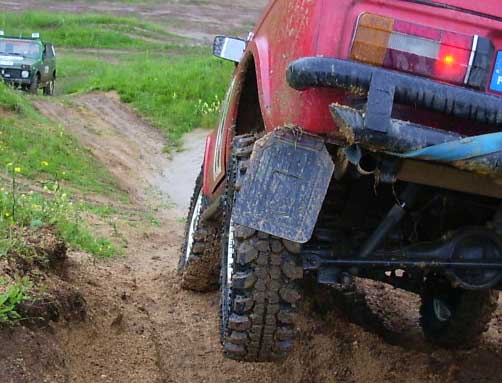
These are Insa Turbo
tyres, they are an affordable copy of the well rated Simex Extreme tread, but
unlike Simex they are available in Niva friendly sizes.
Smaller diameter tyres - will make your car more responsive power-wise, but will decrease your top speed and may slightly increase fuel consumption (especially on motorways). In my 1600 carburetor Niva I find smaller tyres great for around town driving, especially if you live in a hilly town.
Tyre wear - 4WDs can wear tyres quickly (especially if you haven't had your wheel alignment done lately). I save wear on my Mud Tyres by having a separate set of road tyres I use for daily driving. A side effect is that the Niva is quieter and handles better on road tyres during the daily grind.
Width - Narrow mud tyres as factory fitted to most Nivas are ideal in mud with a base. However, for sand width is the important factor. Keep in mind there is a maximum safe (and legal) width that can be fitted to the Niva’s skinny 5 inch rims (5.5 inch on Cossacks etc), and that too wider tyre will sap power on sand. As for mud with no base, good MTs are the only solution with horsepower as a good helper.
Tubes - are used for a reason on Nivas, they allow you to reduce the tyre pressure way down for really soft stuff like sand or snow without the risk on leaking air out of the tyre's bead.
Tyre pressure - Nivas can be quite sensitive to tyre pressure. Increasing the pressure can transform bad handling into good. I've found running my tyres at higher than recommended has lead to better handling - and much less effort to turn the wheel (and related less stresses on the steering gear). But keep an eye on tyre wear in the centre of the tread if you run high pressure (if it starts wearing more quickly in the centre you're running too high pressure).
Tractor tyres - are great for mud, 6.00x16 tractor tyres are about 32 inch and will need a lift and good guard trim. Be gentle on the throttle with them as they get greater than usual traction and rough treatment will break your drive-line (the same goes for aggressive mud tyres).
Snow chains
- I have never used my chains (yet) but here's my understanding: front
and rear are by far the best, however if you only have 1 pair put them on the
uphill end of a 4x4 (especially on slippery descents)
so the vehicle doesn't swap ends on you; whichever end doesn't have the chains
will slide on corners and descents (this includes ascents that suddenly
become descents in reverse). And drive very slow, chains will start to
self-destruct at 25 to 30mph.
Note: chains can be used in mud if you're stuck, but should not be used as a
matter of course in mud as they create a lot of wear
on the track.
Front wheel
arch splash guard bolt heads - if you fit larger tyres and use them
off-road the front tyres may catch on the small bolt heads that hold the splash
guard on at the rear of the front wheel-arch and start to pull them out.. This
is easily avoided by fitting some button headed bolts or screws instead. Make
sure you use rust-proof screws and lubricate them, as getting rusted screws
out without the bolt head could be difficult. Do not be tempted to simply leave
this guard off - mud will collect in the cavity and ruin your Niva badly (for
this reason this guard should be removed and the cavity
cleaned and rust-proofed every year).



This page lives at the www.ladaniva.co.uk/baxter domain if you’re reading it from anywhere else you may not be reading the most up-to-date copy.
| Home | Newbies Guide | Cloggy's DOHC | Lada Niva Clubs | Niva Lift Kits | Gallery | Links |
Please read the General Disclaimer near the bottom of this page